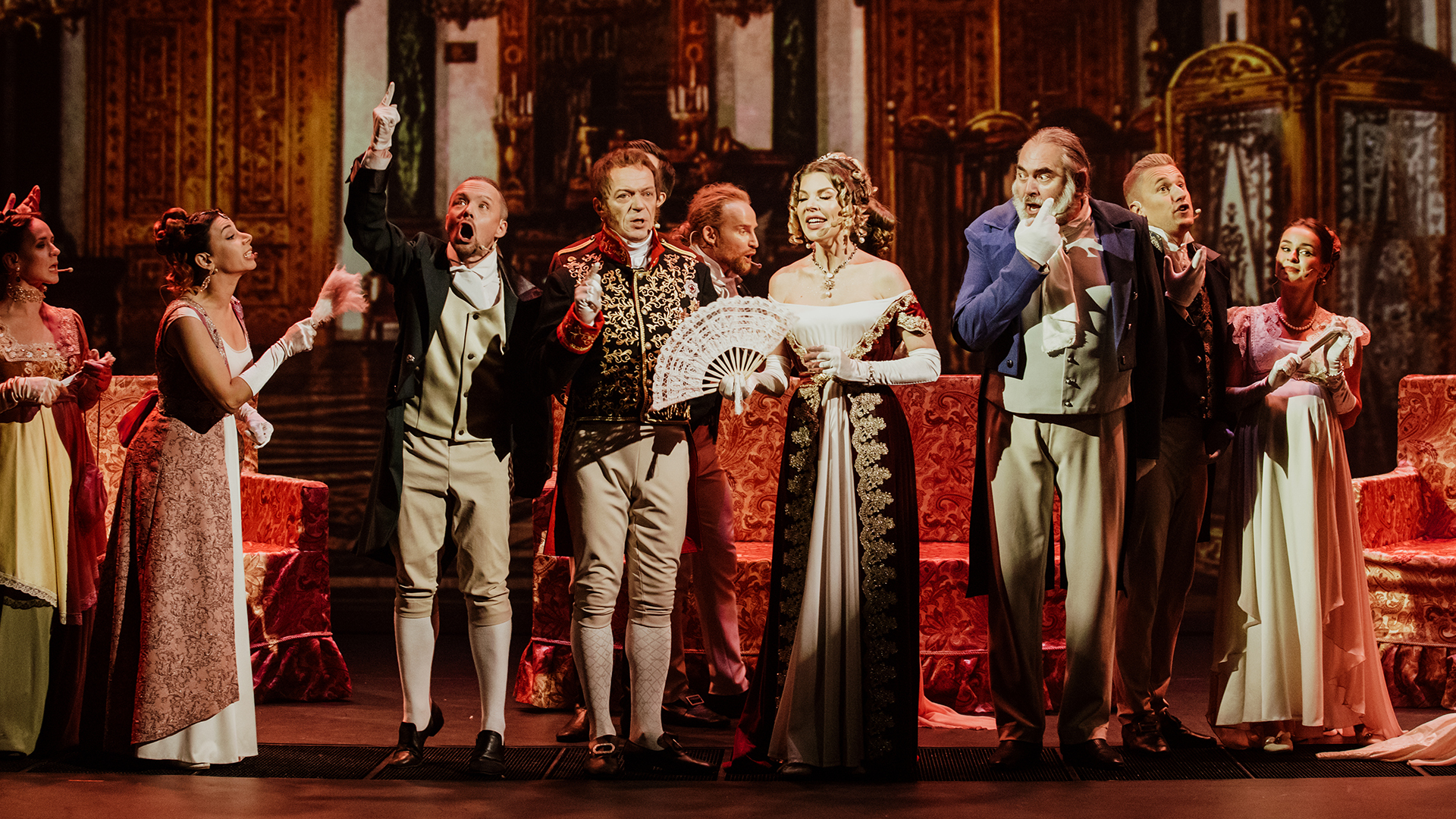Alexei Rybnikov at the Gradsky Hall Theater presented the opera-drama Le prince Andre.
Prince Andrei Bolkonsky.
The main character of the production was one of the central characters in Leo Tolstoy's epic novel "War and Peace".
The performance consists of two acts of 55 minutes each.
The characters speak two languages - French and Russian.
In addition to the text of the novel itself, the libretto is based on the memoirs of Napoleon Bonaparte, as well as on the manifesto and speech of Emperor Alexander I in 1814.
Bolkonsky appears as a detached and tired of social life, a person who does not find understanding either in society or with his young wife Lisa.
In search of the meaning of life, he goes to the front.
Circumstances intensify the hero's internal conflict, but having met love in the person of Natasha Rostova, he returns to life.
However, he faces new challenges.
The suffering and throwing of the hero are masterfully thought out by the authors of the production and convincingly presented on stage.
A complex literary image is also revealed in interaction with other central characters.
"Le prince André.
Prince Andrei Bolkonsky"
© Evgeny Lyulyukin
The main love line is framed in arias, one of which, Je t'aime Natasha, sounds in French.
In general, the music in the production acts as a separate hero and accompanies the characters at all stages of the story, easily creating the right atmosphere and emphasizing their condition.
The main role in the opera is played by Nikita Pozdnyakov, a participant in the Voice show and a soloist of the Alexei Rybnikov Theater.
Roman Orlov (Pierre Bezukhov), Valeria Vorobyova (Natasha Rostova), Alexander Pozdnyakov (Napoleon Bonaparte), Nikolai Lyutov (Alexander I) and other actors of the creative workshop also participate in the production.
The performance, like Tolstoy's novel, opens with a meeting of guests in the salon of Anna Scherer, where the secular society of St. Petersburg conducts conversations in French and discusses the latest gossip.
Prince Bolkonsky arrogantly keeps aloof from the rest.
All these conversations bored him, the company of the perky and cheerful Lisa is also burdensome.
The hero longs for glory in the military field and tells his best friend Pierre Bezukhov not to marry if he wants to achieve something in life.
Bolkonsky decides to go to the front.
In Austerlitz, being an officer whom his comrades look up to, the prince does not miss the opportunity to prove his loyalty to duty and service, barely avoiding death.
The author adheres to the chronological order of the narrative and displays all the most significant events of the novel associated with the prince.
As a result, throughout the production there is no feeling that some details are missing.
Successfully chosen dynamics and rhythm do not confuse the viewer and revive the four-volume epic in memory.
The unfolding action is complemented by video installations, the purpose of which is to immerse the viewer in the atmosphere of the 19th century.
Technically, the authors of the production managed to expand the stage space with the help of special effects and convey the scale, especially in the battle scenes, however, it was not possible to organically combine the stage and video materials into a single space: due to the aged, as if archival videos, the synchronism and integrity of the action was violated.
However, in scenes where it is necessary to show the interior of noble estates, photo inserts complement the interior in the best possible way.
Le Prince Andre.
Prince Andrei Bolkonsky"
© Evgeny Lyulyukin
Another significant shortcoming of the performance is the phonogram that accompanies most of the libretto.
But, if you close your eyes to it, in general, Rybnikov's musical experiment can be called quite successful: the characters perform both arias and arioso, and the live orchestra dilutes the theatrical performance, helping the audience to immerse themselves in this or that event.
For example, in the scene of the meeting between Natasha Rostova and Anatole Kuragin in the opera, a melody sounds that reflects the inner excitement and trembling of Rostova, who is confused in her feelings and rushing between love for Bolkonsky and falling in love with Kuragin.
If the entourage and costumes of the characters take the audience back 200 years, then the musical arrangement returns to reality, since some of its elements sound modern.
The cast of the show is well chosen.
Valeria Vorobyova managed to convey Rostova's childish spontaneity, as well as the inner growth of the heroine, and Roman Orlova's Pierre Bezukhov turned out to be believable, despite external differences (the actor is not "square") and a small amount of time devoted to the development of the character's character.
The artist managed to embody both confusion, and awkwardness, and the determination of his hero.
Alexander Pozdnyakov deserves special mention - Napoleon in his performance turned out to be impressive, canonically smug, daring and purposeful.
Only Andrey Bolkonsky is not exemplary at all.
The hero of Pozdnyakov, contrary to the original source, appears not as a classical stately prince without flaws, but very alive, with the inherent advantages and disadvantages of a person.
For the first time, a drama-opera about Prince Bolkonsky was staged at the Et Cetera theater in May 2021.

